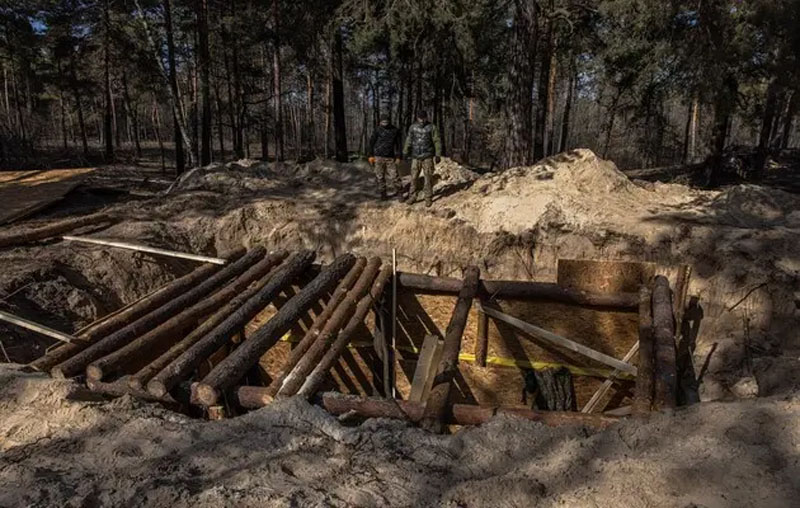Золотые блиндажи. Кто зарабатывает и «наваривает» на строительстве фортификаций


По каким схемам «пилят» бюджет при закупке леса органы власти, заказывавшие строительство этих линий, и частные подрядчики?
В разгаре скандал вокруг харьковских линий обороны. По каким схемам «пилят» бюджет при закупке леса органы власти, которые заказывали строительство этих линий, и частные подрядчики? Касается ли это только начальника Харьковской ОГА Олега Синегубова, и кто, наконец, в этих схемах «теневой бухгалтер», которого сейчас старательно вычисляет СБУ?
В сентябре 2022 года правительство постановлением №1003 отдало весь государственный промышленный лесной ресурс в хозяйственное использование одному предприятию-монополисту «Леса Украины» (вместо ликвидированных 156 отдельных лесхозов). Создание во время войны единого управленческого и логистического центра для оперативного решения важных задач, прежде всего связанных со строительством фортификационных укреплений, выглядело разумным шагом.
Понятно, что Министерству обороны и областным военным администрациям в условиях катастрофической нехватки времени и бюджетных денег целесообразно было работать с одним централизованным поставщиком бревен в лице государственного специализированного предприятия, которое могло гарантировать их своевременную доставку в нужных объемах. Причем из первых рук и по минимальной цене без рыночных накруток.
Но практика снова разошлась с теорией.
Покупка за тысячу — перепродажа за пять
Народные депутаты создают при Верховной Раде временную следственную комиссию, чтобы исследовать использование бюджетных средств при обустройстве инженерных заграждений на линии соприкосновения.
Управление СБУ в Харьковской области переводит в активную фазу досудебное расследование в открытом 14 февраля этого года уголовном производстве по «созданию определенной группой лиц противоправного механизма завышения фактической стоимости древесины, поставляемой для строительства фортификационных сооружений на территории Харьковской области».
На днях через судебное постановление правоохранители истребовали у Харьковской областной военной администрации полный пакет документов (57 тысяч печатных листов) о приобретении лесоматериалов у ряда частных фирм. Они предполагают, что при заключении Харьковской ОВА сделок с этими фирмами есть признаки уголовного правонарушения, а именно: присвоение и растрата чужого имущества путем злоупотребления служебным положением и препятствование законной деятельности ВСУ. «С целью реализации указанного противоправного умысла были зарегистрированы отдельные предприятия с признаками фиктивности, которые контролируются через „теневых“ бухгалтеров», — отмечается в документе.
Одна из схем, задокументированных в ходе следствия, заключалась в том, что указанные предприятия якобы покупали бревна у харьковских государственных лесхозов по цене 970 грн за кубометр. А затем Харьковская ОГА в лице департамента ЖКХ перекупала тот же кубический метр по цене 4100 грн. Причем в цену, как считает СБУ, была заложена фиктивная логистическая составляющая.
Следователи как раз устанавливают лиц, причастных к бюджетному «распилу», и высчитывают окончательную цифру «лишних» переплат из военного бюджета, на данный момент — из общей суммы 170 млн грн, на которую заключены попавшие в их поле зрения харьковские контракты.
Судя по всему, это только один эпизод в схеме наживы на фортификационном лесе, развернутой во фронтовых областях.
«Скажите нам спасибо, что не 8-10 тысяч за куб, как берут другие фирмы, возящие лес на Запорожское и Донецкое направления!» — эмоционально подчеркивал на недавнем брифинге в Харьковской ОГА представитель одной из частных подрядных организаций.
«В среднем мы закупали лес для фортификации у частных фирм по цене 5500 грн за кубометр с учетом транспортных расходов. Непосредственно на товарной бирже такую древесину, возможно, кто-то и покупает за 2 тысячи гривен. Но мы ориентировались на рыночные цены», — объясняет заместитель начальника Харьковской ОГА Михаил Харнам, до недавнего времени директор местного ООО „Строитель“.
Весь лес — фирмам-«прокладкам»!
Вся схема нерационального (скажем так) использования бюджетных средств с существенным завышением стоимости лесоматериалов и их доставки на жизненно важные прифронтовые объекты как раз кроется в ответе на вопрос: каким образом в критический для страны момент их нужный объем оказался у физических лиц-предпринимателей, а не у специализированного государственного предприятия — постоянного лесопользователя ГП «Леса Украины», в собственности которого с начатой в войну лесной реформой находятся почти все лесосеки и заготовленная из них древесина?
«У меня не было времени идти на товарную биржу, выискивать по всей стране бревна и выстраивать логистические цепи их перевозки аж из полесских лесов под Волчанск и Купянск, — объясняет начальник Харьковской ОВА Олег Синегубов, — Конечно, мы в первую очередь обратились в государственное предприятие „Леса Украины“, разослали запросы на государственные лесхозы с просьбой предоставить нам 50 тысяч кубов лесоматериалов, необходимых для выполнения правительственной задачи срочно обеспечить третью линию обороны. Нам официально ответили за подписью Юрия Болоховца, гендиректора этого отраслевого ГП, что таких объемов у них нет. Есть, мол, где-то на остатках по несколько десятков кубов на Черниговщине, в центральных и западных областях, причем только под самовывоз. Нужный лес мы нашли у ФОПов, которые к тому же взялись обеспечить его доставку. С ними и заключили прямые безавансовые договоры, вне тендерных процедур, на которые нет времени. Завысили ли при этом сумму конечного расчета? Пусть ответят независимые эксперты. Наконец, мы чуть ли не ежедневно отчитываемся в режиме онлайн перед правительством и офисом президента о ходе строительства фортификационных объектов. Каждый наш шаг, каждый контракт и даже каждое слово в переговорах с подрядчиками под контролем правоохранителей, у которых, согласитесь, есть возможность вовремя указать нам на недостатки и предостеречь от ошибок».
Об одном из таких недостатков, который существенно накручивает цену на лес, давно криком кричат деревопереработчики, объясняя лесным реформаторам из офиса президента, что признание бревен биржевым товаром (отдельным правительственным постановлением №1433 за два месяца до войны!) никак не способствует развитию лесного сектора, а только дает возможность частным биржам снимать толстую «стружку» с деревоперерабатывающих предприятий. А теперь еще и из военного бюджета. Биржевые торги, где начальная цена кубометра от ГП «Леса Украины» может прыгнуть в два раза и больше, точно лишние в бюджетных расчетах между государственным предприятием и государственными учреждениями при выполнении военных задач.
Учитывая необходимость считать каждую бюджетную копейку, правительство должно требовать от всех распорядителей госсредств выполнять требования своего постановления №1275 об особенностях осуществления оборонных закупок на период действия режима военного положения, а значит, выходить на прямые договоры с ГП «Леса Украины».
С другой стороны, обязать лесного монополиста зарезервировать стратегически важные сортименты леса и продавать их напрямую государственным учреждениям, а не частным фирмам. Причем по фиксированной цене, приближенной к себестоимости кубометра древесины.
Какие вообще могут быть рыночно-биржевые накрутки на материалах для оборонных линий воюющей страны?
Более того, созданное на производственно-технической базе государственных лесхозов (у которых были свои машины для транспортировки лесоматериалов, загрузочные площадки с кранами и деревоперерабатывающие цеха) ГП «Леса Украины» запросто могло бы не только обеспечить всю логистическую цепочку по доставке древесины, но даже возводить инженерно-фортификационные сооружения. Без помощи всевозможных ФЛП, а следовательно, без необоснованных бюджетных расходов.
Однако не удивимся, что через полтора года «лесной реформы» государственное предприятие уже не сможет похвастаться крепкими производственно-техническими тылами. В конце концов, реформаторы отрасли и не скрывали, что затеяли реформу как раз ради внедрения рыночных отношений ГП с частниками при выполнении за государственные средства всех видов работ, связанных с лесом. Что ж, они достигли значительного прогресса.
Фиктивная логистика за счет бюджета?
Олег Синегубов уверял на уже упомянутой пресс-конференции в Харьковской ОГА, что ему все равно, кто основатель далеких от лесной отрасли семи частных фирм, которые с 2023 года получили от него более двух сотен фортификационных контрактов на 302 млн грн. Главное, чтобы не было связи со страной-агрессором и чтобы 71,6 тыс кубометров строительного леса были доставлены в нужных объемах в оговоренный срок.
Однако начальника ОВА не может не волновать цена вопроса, причем именно с позиций интересов государства. А значит, он как собственник лесного ресурса Харьковщины имеет все полномочия, тем более в войну, поставить перед лесопользователями (ГП «Леса Украины» и несколькими харьковскими гослесхозами, подчиненными Государственному агентству лесных ресурсов Украины) задачу по доставке оборонного леса с четким определением объема и цены.
Зато Харьковская ОГА, а также другие военные администрации фронтовых областей как распорядители фортификационного бюджета (а это в целом почти 7 млрд грн) подписались на схему частных подрядов с фирмами-«прокладками» с заоблачным ростом цены кубометра древесины.
«Проанализировав биржевые торги, могу документально подтвердить, что у лесоводов были нужны Олегу Синегубову и начальникам ОВА других областей лесоматериалы и возможности их доставки к месту строительства фортификаций, — убежден эксперт по вопросам функционирования рынка древесины Даниил Маландий, — Но централизованно была создана схема для легализации продажи леса-кругляка для оборонительных сооружений в пользу частных фирм. К примеру, в Харьковской области основным закупщиком было ООО «Агро Х» с волынской пропиской. Фирма участвовала во всех нынешних биржевых торгах фортификационных сортиментов у местных лесхозов. А это тысячи кубов хвойных пород. Только из Изюмского лесхоза за последние два месяца этому ООО отгружено 6 186 кубов сосны для фортификаций. Затем эти кубы уже фигурировали в договорах купли-перепродажи другим фирмам, как правило, связанным между собой одними учредителями. Они каждый раз увеличивали стоимость леса, в том числе через фиктивные логистические расходы.
Схема действует не только на Харьковщине. Весь «банкет» в итоге оплачивали из бюджета областные военные администрации. Кто конкретно наживается на этих кровавых деньгах, пусть выясняют правоохранители».
Зачем Болоховец отказал Синегубову?
Суммы вероятных бюджетных потерь на схемах с фортификационным лесом несложно представить после того, как ГП «Леса Украины» начало сейчас аврально выдавать на-гора официальную информацию о своем активном участии в прямых поставках военным древесины непосредственно с нижних складов, без помощи частных фирм-«прокладок».
На днях, например, лесоводы выиграли тендер Минобороны на 28 тыс. кубометров леса. С конечной ценой 3750 грн за кубометр, куда вошла цена доставки продукции. Тогда как в сметах областных военных администраций цифры колеблются в диапазоне 5 500-11 400 грн/кубометр.
«Наше предприятие способно полностью обеспечить древесиной строительство фортификаций. Считаем правильным, если древесина будет поставляться напрямую от производителя. Это позволит оптимизировать расходы бюджета, гарантировать качество и своевременность поставок», — отмечает Юрий Болоховец, который еще недавно, по словам Олега Синегубова, официально отказал ему предоставить лесоматериалы на строительство линий обороны Харькова.
Recent Posts
Сбежавший в Швейцарию блогер Станислав Домбровский просит прощения у украинцев
Одесский трэш блогер Стас Домбровский, который в последнее время проживает в Швейцарии, записал видеообращение к…
Александра Устинова и атака на руководство АОЗ: что стоит за волной критики
Александра Устинова, народная депутат, которая в последние дни активно атакует Агентство оборонных закупок (АОЗ) возможно…
Журналисты показали имение киевской судьи, закрывшей дело Приходько
Свобода "под ключ" или манипуляция правосудием? Борис Приходько – нацбанкир времен Януковича и действующий нардеп…
Судьи вне закона
В течение последних трех лет внимание общественности если и бывает приковано к судам, то гораздо…
Артем Ляшанов и bill_line спасают репутацию через суд
Финтех-компания столкнулась с обвинениями в отмывании денег игорной мафии. ООО «Тех-Софт Атлас» (ТМ «bill_line») и…
Криптобиржа WhiteBIT: как Владимир Носов и «регионалы» Шенцевы отмывают деньги и помогают спецслужбам России
Владимир Носов в Украине пытается позиционировать себя как респектабельный бизнесмен и хозяин криптобиржи WhiteBIT. Однако…

